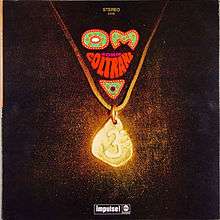Om (John Coltrane album)
| Om | ||||
|---|---|---|---|---|
 | ||||
| Studio album by John Coltrane | ||||
| Released | January/early February 1968[1] | |||
| Recorded |
October 1, 1965 Camelot Sound Studios, Lynwood, Washington | |||
| Genre | Free Jazz, Avant-garde jazz | |||
| Length | 29:07 | |||
| Label |
Impulse! A-9140 | |||
| Producer | Bob Thiele | |||
| John Coltrane chronology | ||||
| ||||
| Professional ratings | |
|---|---|
| Review scores | |
| Source | Rating |
| Allmusic | |
| Sputnikmusic | |
| The Rolling Stone Jazz Record Guide | |
Om is a 1968 album by John Coltrane recorded in October 1965.
Om refers to the sacred syllable in Hinduism, which symbolizes the infinite or the entire Universe. Coltrane described Om as the "first syllable, the primal word, the word of power". Issued posthumously, the 29-minute recording contains chants from the Bhagavad Gita[5] "Coltrane and one or two other musicians begin and end the piece by chanting in unison a verse from chapter nine ("The Yoga of Mysticism") of the Bhagavad Gita: Rites that the Vedas ordain, and the rituals taught by the scriptures: all these I am, and the offering made to the ghosts of the fathers, herbs of healing and food, the mantram, the clarified butter. I the oblation, and I the flame into which it is offered. I am the sire of the world, and this world's mother and grandsire. I am he who awards to each the fruit of his action. I make all things clean. I am Om!" a Hindu holy book, as well as Coltrane and Pharoah Sanders chanting from a Buddhist text, The Tibetan Book of the Dead,[6] and reciting a passage describing the primal verbalization "om" as a cosmic/spiritual common denominator in all things.
It was included on The Major Works of John Coltrane CD released in 1992.
Background
Om was recorded just a day after Coltrane and his band played live in Seattle. The next day, they went over to a nearby recording studio to record Om. It is believed that Coltrane was using LSD during the recording, though some people have said this is only a myth.[7] It has also been rumored that Coltrane didn't want this recording released. However, Bob Thiele, the director and producer of Impulse! released in 1968 to capitalize on his death and to capitalize on the growing psychedelic rock scene at the time. When it was released, many people considered it to be the worst album Coltrane had ever produced. However, critics have been much more accepting of this album over the years.
Reception
Allmusic rewarded 2.5 out of 5 stars and said, "Condemned by many critics as John Coltrane's worst album, Om suffers only in comparison to the great works that preceded it."[8] Sputnikmusic gave it 4 out of stars and The Rolling Stone Jazz Record Guide gave it 3 out of 5 stars.
Track listing
| Side A | ||
|---|---|---|
| No. | Title | Length |
| 1. | "Om, Part 1" | 15:06 |
| Side B | ||
|---|---|---|
| No. | Title | Length |
| 2. | "Om, Part 2" | 14:01 |
Note: while some CD configurations had "Om" as a single track, others kept the original LP record's original two-track configuration.
Personnel
- John Coltrane - tenor and soprano saxophone
- Pharoah Sanders - tenor saxophone
- Donald Rafael Garrett - double bass and clarinet
- Joe Brazil - flute
- McCoy Tyner - piano
- Jimmy Garrison - bass
- Elvin Jones - drums
The sleevenotes credit Garrett with "bass clarinet": the musician himself has corrected this
References
- ↑ Billboard Feb 3, 1968
- ↑ Proefrock, Stacia. Om at AllMusic
- ↑ Campbell, Hernan M. (25 April 2012). "Review: John Coltrane - Om | Sputnikmusic". sputnikmusic.com. Retrieved 10 April 2013.
- ↑ Swenson, J. (Editor) (1985). The Rolling Stone Jazz Record Guide. USA: Random House/Rolling Stone. p. 47. ISBN 0-394-72643-X.
- ↑ Lavezzoli, Peter (2006). The dawn of Indian music in the West : Bhairavi. London: Continuum. p. 285. ISBN 0-8264-1815-5.
- ↑ Nisenson, Eric (1995). Ascension: John Coltrane and His Quest. Da Capo Press. p. 183. ISBN 0-306-80644-4.
- ↑ Lavezzoli, Peter (April 2006). The Dawn of Indian Music in the West: Bhairavi. Continuum International Publishing Group. p. 285.
Coltrane had begun using LSD during this time, in order to inverstigate its ability to access new levels of consciousness. It has long been rumored that Coltrane was under the influence of the drug while recording Om, and while this has never fully been corroborated, it would almost make sense, as the recording sounds disjointed and hallucinatory, almost as though Coltrane is not in full control of his normal faculties... the opening chant is followed by some of the most dissonant and paint-peeling shrieks on any Coltrane recording. Whether or not Coltrane was on LSD when recording this piece, it is perhaps not the most suitable for listening while on LSD, as the music communicates an intense feeling of unrest.
- ↑ "Om - John Coltrane | Songs, Reviews, Credits | AllMusic". AllMusic. Retrieved 2016-05-20.